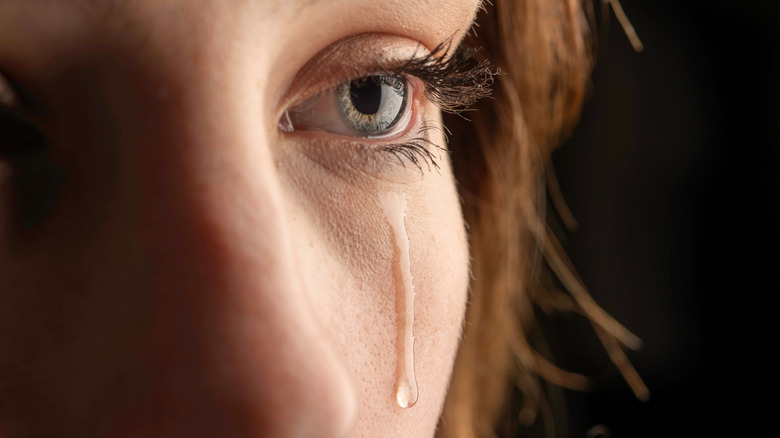Why Some People Have A Hard Time Crying
Crying serves many purposes. Sometimes our tears emerge for emotional reasons, like when we express sympathy, show a need for support, or respond to stress (via Healthline). Other times, crying may have more physiological purposes, such as to relieve physical pain, communicate hunger as an infant (via mindbodygreen), or as an involuntary response to irritants in the eye.
While crying is a perfectly natural bodily function, it doesn't come easy to everyone. This can occur for a variety of reasons ranging from imposed societal expectations, to personal experiences or trauma, or the presence of certain medical conditions, explains mindbodygreen. Some people may have learned to repress their emotions over time for fear of shame, stigma, or embarrassment — particularly as it relates to gender.
Additionally, mental health conditions such as depression or anxiety can rewire the brain and numb our emotional state, which can also make crying difficult. Licensed mental health counselor Mary Joye explains to mindbodygreen, "The limbic system, which activates our fight/flight/freeze responses along with other parts of the brain that process emotions can be disrupted, and healthy neural activity impaired."
Medical conditions that impact tear production
In some cases, an inability to cry may be the result of a medical condition. One such condition, known as keratoconjunctivitis sicca, is characterized by dry eyes and is often associated with diabetes, thyroid issues, pregnancy, or menopause (via Healthline).
"Rarely, genetic medical conditions, such as familial dysautonomia, result in the lack of tear formation when one is in a state of emotional crying," Dr. Michael Chen tells mindbodygreen. With symptoms often presenting in infancy, this disorder targets the autonomic nervous system and disrupts cell function related to tear production, per MedlinePlus.
According to research presented to the European League Against Rheumatism, another condition known to impact crying is an immune disease known as Sjogren's syndrome. Evidenced in a study involving 300 patients, those with Sjogren's syndrome demonstrated dryness of the eyes and mouth due to hindered saliva and tear production. Researcher on the study Ms. Ninke Van Leeuwen from Utrecht University, stated via Science Daily that when it comes to crying, " ... [these individuals] often have to rely on words and facial expressions instead of tears as a result."
If you or someone you know is struggling with mental health, please contact the Crisis Text Line by texting HOME to 741741, call the National Alliance on Mental Illness helpline at 1-800-950-NAMI (6264), or visit the National Institute of Mental Health website.


